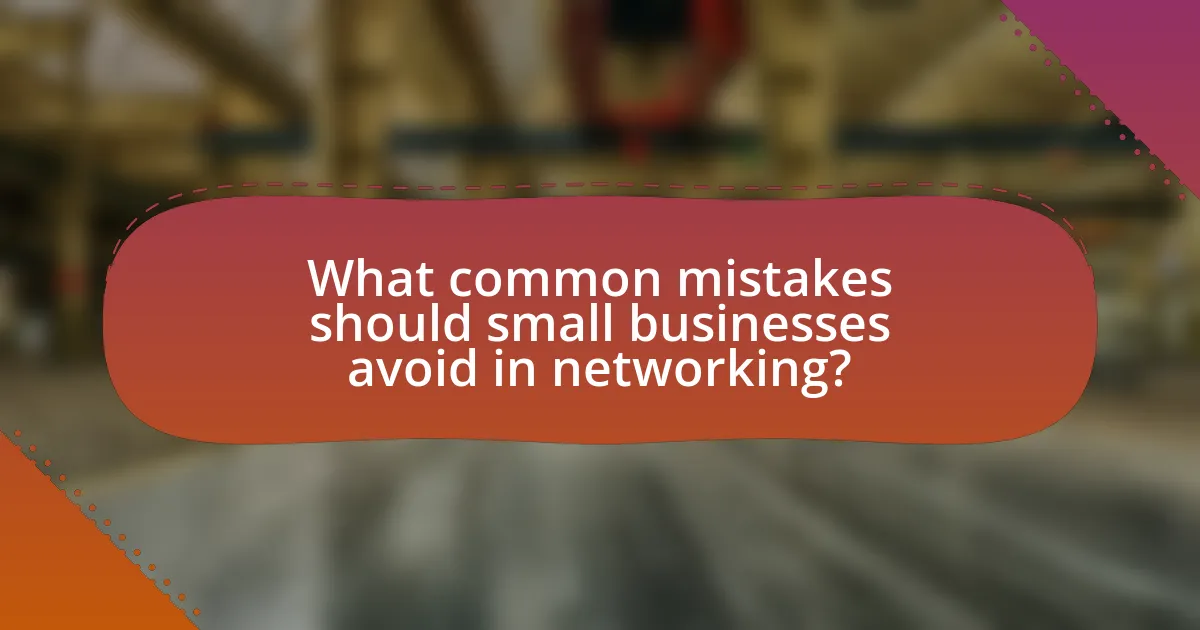Networking for small businesses is the process of establishing and nurturing professional relationships that can lead to collaboration, referrals, and support, which are vital for growth and visibility. The article outlines the benefits of networking for local entrepreneurs, emphasizing its role in accessing resources and opportunities, and highlights key elements of effective networking, such as relationship building and communication. It also discusses strategies for successful networking, including attending events and leveraging social media, while addressing common mistakes and challenges faced by small businesses without a robust network. Additionally, the article provides practical tips and tools to enhance networking efforts, underscoring the importance of follow-up and community engagement in fostering meaningful connections.

What is Networking for Small Businesses?
Networking for small businesses refers to the process of establishing and nurturing professional relationships that can lead to opportunities for collaboration, referrals, and support. This practice is essential for small businesses as it helps them connect with potential clients, partners, and industry peers, ultimately enhancing their visibility and growth potential. According to a survey by the Small Business Administration, 70% of small businesses report that networking has been crucial for their success, highlighting its importance in building a robust business ecosystem.
How does networking benefit local entrepreneurs?
Networking benefits local entrepreneurs by providing access to resources, opportunities, and support that can enhance their business growth. Through networking, entrepreneurs can establish valuable connections with other business owners, potential clients, and industry experts, which can lead to collaborations, partnerships, and referrals. For instance, a study by the Kauffman Foundation found that 70% of small businesses rely on networking to gain new customers and improve their market presence. This demonstrates that effective networking can significantly contribute to the success and sustainability of local enterprises.
What are the key elements of effective networking?
The key elements of effective networking include building relationships, effective communication, and mutual benefit. Building relationships involves establishing trust and rapport with others in your industry, which can lead to opportunities for collaboration and support. Effective communication is crucial, as it allows individuals to clearly express their ideas and intentions, fostering understanding and engagement. Mutual benefit emphasizes the importance of creating win-win situations, where all parties involved gain value from the interaction. Research indicates that networking can significantly enhance business growth; for instance, a study by the Harvard Business Review found that 70% of jobs are found through networking, highlighting its effectiveness in professional advancement.
How can networking lead to business growth?
Networking can lead to business growth by creating opportunities for collaboration, referrals, and partnerships. When entrepreneurs engage in networking, they build relationships that can result in increased visibility and access to new markets. For instance, a study by the Kauffman Foundation found that 70% of small businesses attribute their growth to networking and referrals. This demonstrates that effective networking not only enhances credibility but also facilitates the exchange of resources and knowledge, ultimately driving business expansion.
Why is networking essential for small businesses?
Networking is essential for small businesses because it facilitates connections that can lead to new opportunities, partnerships, and customer referrals. Small businesses often operate with limited resources, making relationships crucial for growth and sustainability. According to a study by the Small Business Administration, 70% of small businesses rely on networking to gain new clients and enhance their visibility in the market. Networking also provides access to valuable industry insights and best practices, which can help small businesses adapt and thrive in competitive environments.
What challenges do small businesses face without networking?
Small businesses face significant challenges without networking, including limited access to resources, reduced visibility, and a lack of support. Without networking, small businesses struggle to connect with potential customers, suppliers, and partners, which can hinder growth and innovation. Research indicates that 70% of small businesses rely on networking for referrals and new business opportunities, highlighting its critical role in sustaining operations. Additionally, without a network, small businesses may miss out on valuable industry insights and mentorship, which can lead to poor decision-making and increased vulnerability to market changes.
How does networking enhance community engagement?
Networking enhances community engagement by fostering relationships that connect individuals and organizations, leading to increased collaboration and participation in local initiatives. When small business owners engage in networking, they create opportunities for dialogue and partnership, which can result in joint events, shared resources, and a stronger sense of community. Research indicates that communities with active networking among businesses experience higher levels of civic participation and social cohesion, as evidenced by a study from the National Civic League, which found that collaborative networks significantly improve community problem-solving and engagement outcomes.

What strategies can small businesses use for effective networking?
Small businesses can use strategies such as attending local events, leveraging social media, and forming partnerships to network effectively. Attending local events, such as trade shows and community gatherings, allows small business owners to meet potential clients and collaborators face-to-face, fostering personal connections. Leveraging social media platforms, like LinkedIn and Facebook, enables businesses to reach a broader audience, engage with customers, and share valuable content that showcases their expertise. Forming partnerships with other local businesses can create mutually beneficial relationships, allowing for shared resources and cross-promotion, which can enhance visibility and credibility in the community. These strategies are supported by research indicating that networking significantly contributes to business growth and success, with studies showing that 70% of jobs are found through networking.
How can local entrepreneurs identify networking opportunities?
Local entrepreneurs can identify networking opportunities by actively participating in community events, industry conferences, and local business meetups. Engaging in these activities allows entrepreneurs to connect with peers, potential clients, and mentors, fostering valuable relationships. According to a survey by the Small Business Administration, 70% of small business owners report that networking has significantly contributed to their business growth. Additionally, utilizing social media platforms like LinkedIn can help entrepreneurs discover local networking events and connect with other professionals in their field.
What types of events should small businesses attend?
Small businesses should attend networking events, trade shows, industry conferences, and local community events. Networking events facilitate connections with potential clients and partners, while trade shows provide opportunities to showcase products and services to a targeted audience. Industry conferences offer insights into market trends and best practices, enhancing knowledge and visibility. Local community events help build brand recognition and foster relationships within the community, which is crucial for small business growth. According to a survey by the Small Business Administration, 70% of small businesses report that networking has been essential to their success.
How can online platforms facilitate networking?
Online platforms facilitate networking by providing accessible spaces for individuals and businesses to connect, share resources, and collaborate. These platforms, such as LinkedIn, Facebook Groups, and industry-specific forums, enable users to create profiles, join discussions, and participate in events, thereby expanding their professional networks. According to a 2021 survey by LinkedIn, 85% of jobs are filled through networking, highlighting the effectiveness of these platforms in fostering connections that can lead to business opportunities.
What are the best practices for building a strong network?
The best practices for building a strong network include actively engaging with others, providing value, and maintaining consistent communication. Actively engaging involves attending networking events, joining professional organizations, and participating in community activities, which can lead to meaningful connections. Providing value means sharing knowledge, resources, or assistance to others, fostering goodwill and reciprocity. Maintaining consistent communication ensures relationships remain strong; this can be achieved through regular follow-ups, sharing relevant information, and expressing appreciation. Research indicates that 70% of jobs are found through networking, highlighting the importance of these practices in professional growth and opportunities.
How can small businesses create meaningful connections?
Small businesses can create meaningful connections by actively engaging with their local communities through networking events, social media interactions, and personalized customer service. Engaging in local events, such as farmers’ markets or community fairs, allows small businesses to meet potential customers face-to-face, fostering trust and rapport. Additionally, utilizing social media platforms to share stories, respond to customer inquiries, and showcase community involvement can enhance visibility and relatability. Research indicates that 70% of small businesses report that networking has led to increased sales, demonstrating the effectiveness of these strategies in building lasting relationships.
What role does follow-up play in networking success?
Follow-up is crucial for networking success as it reinforces connections and fosters relationships. Engaging with contacts after initial meetings demonstrates professionalism and genuine interest, which can lead to collaborative opportunities. Research indicates that 80% of sales require five follow-up calls after the initial meeting, highlighting the importance of persistence in building professional relationships. Additionally, consistent follow-up can increase the likelihood of referrals, as 70% of people prefer to do business with someone they know and trust. Thus, effective follow-up is a key strategy for small businesses aiming to enhance their networking efforts.

What common mistakes should small businesses avoid in networking?
Small businesses should avoid the mistake of not having a clear networking strategy. A lack of direction can lead to wasted time and missed opportunities. Additionally, small businesses often fail to follow up with contacts after initial meetings, which can hinder relationship building and limit potential collaborations. Another common mistake is focusing solely on selling rather than building genuine relationships, as networking is fundamentally about creating connections. Lastly, neglecting to leverage social media platforms for networking can result in missed outreach opportunities, given that 73% of marketers believe that social media is effective for their business.
How can entrepreneurs recognize ineffective networking habits?
Entrepreneurs can recognize ineffective networking habits by assessing the quality and outcomes of their interactions. If networking efforts consistently yield minimal connections, lack of follow-up, or no tangible benefits, these are indicators of ineffective habits. Research shows that 70% of jobs are found through networking, highlighting the importance of effective connections. Therefore, if entrepreneurs find themselves attending numerous events without gaining valuable contacts or leads, it signals a need to reevaluate their networking strategies.
What are the signs of a poorly executed networking strategy?
Signs of a poorly executed networking strategy include a lack of meaningful connections, ineffective communication, and minimal follow-up with contacts. When small businesses fail to establish genuine relationships, they miss opportunities for collaboration and support. Ineffective communication, such as unclear messaging or failure to articulate value propositions, leads to misunderstandings and disengagement. Additionally, minimal follow-up indicates a lack of commitment to nurturing relationships, which can result in lost opportunities for referrals and partnerships. These signs collectively demonstrate that the networking efforts are not yielding beneficial outcomes for the business.
How can small businesses learn from networking failures?
Small businesses can learn from networking failures by analyzing the reasons behind unsuccessful interactions and adjusting their strategies accordingly. For instance, if a small business fails to establish meaningful connections, it can evaluate factors such as communication style, target audience alignment, and follow-up practices. Research indicates that 70% of small businesses cite networking as crucial for growth, yet many struggle with ineffective networking approaches. By reflecting on past experiences, seeking feedback, and implementing changes, small businesses can enhance their networking effectiveness and foster more productive relationships in the future.
What tools and resources can enhance networking efforts?
Effective tools and resources that can enhance networking efforts include social media platforms, professional networking sites, and local business organizations. Social media platforms like LinkedIn facilitate connections with industry professionals, allowing users to share insights and opportunities. Professional networking sites, such as Meetup, provide avenues for attending events and meeting like-minded individuals. Local business organizations, such as chambers of commerce, offer resources and events that foster community engagement and collaboration among entrepreneurs. These tools and resources are essential for building relationships, sharing knowledge, and expanding professional networks, which are critical for small business success.
Which networking apps are most beneficial for small businesses?
LinkedIn, Meetup, and Bumble Bizz are among the most beneficial networking apps for small businesses. LinkedIn offers a professional platform for connecting with industry peers, showcasing expertise, and finding potential clients, with over 900 million users globally, making it a vital tool for business networking. Meetup facilitates local networking events and groups, allowing small business owners to connect with like-minded individuals and potential customers in their area, enhancing community engagement. Bumble Bizz, an extension of the Bumble dating app, focuses on professional networking, enabling users to create business connections in a casual environment, which can lead to collaborations and partnerships. These apps provide essential networking opportunities that can significantly impact the growth and visibility of small businesses.
How can social media be leveraged for networking?
Social media can be leveraged for networking by creating professional profiles, engaging with industry-related content, and participating in relevant groups or forums. By establishing a strong online presence, entrepreneurs can connect with potential clients, partners, and industry peers. For instance, LinkedIn allows users to showcase their expertise and network with other professionals, while platforms like Facebook and Twitter enable real-time interactions and discussions. According to a 2021 survey by LinkedIn, 85% of jobs are filled through networking, highlighting the effectiveness of social media in building professional relationships.
What practical tips can local entrepreneurs implement for successful networking?
Local entrepreneurs can implement several practical tips for successful networking, including attending local business events, joining community organizations, and utilizing social media platforms. Attending local business events, such as trade shows and chamber of commerce meetings, allows entrepreneurs to meet potential clients and partners face-to-face, fostering personal connections that can lead to business opportunities. Joining community organizations, like local business associations, provides a platform for collaboration and support among peers, enhancing visibility and credibility within the local market. Utilizing social media platforms, particularly LinkedIn, enables entrepreneurs to connect with industry professionals, share insights, and engage in discussions that can expand their network and influence. These strategies are effective as they create opportunities for relationship-building, which is essential for business growth and sustainability.




